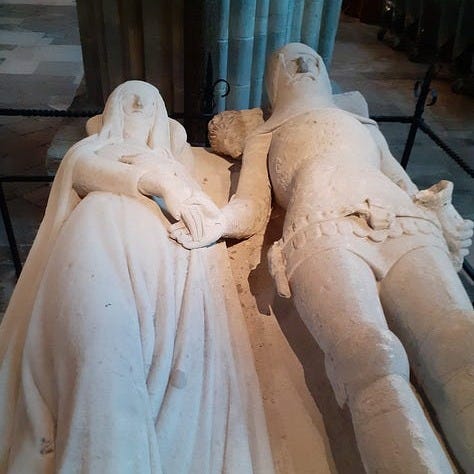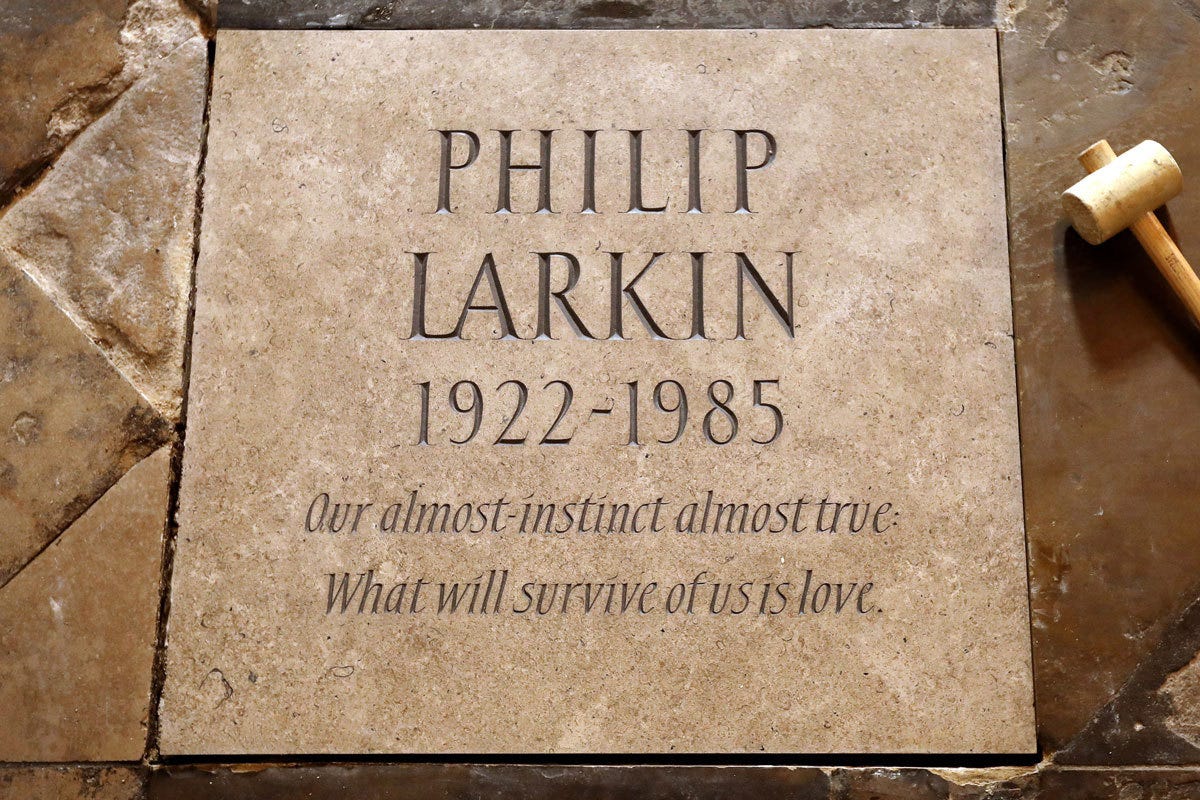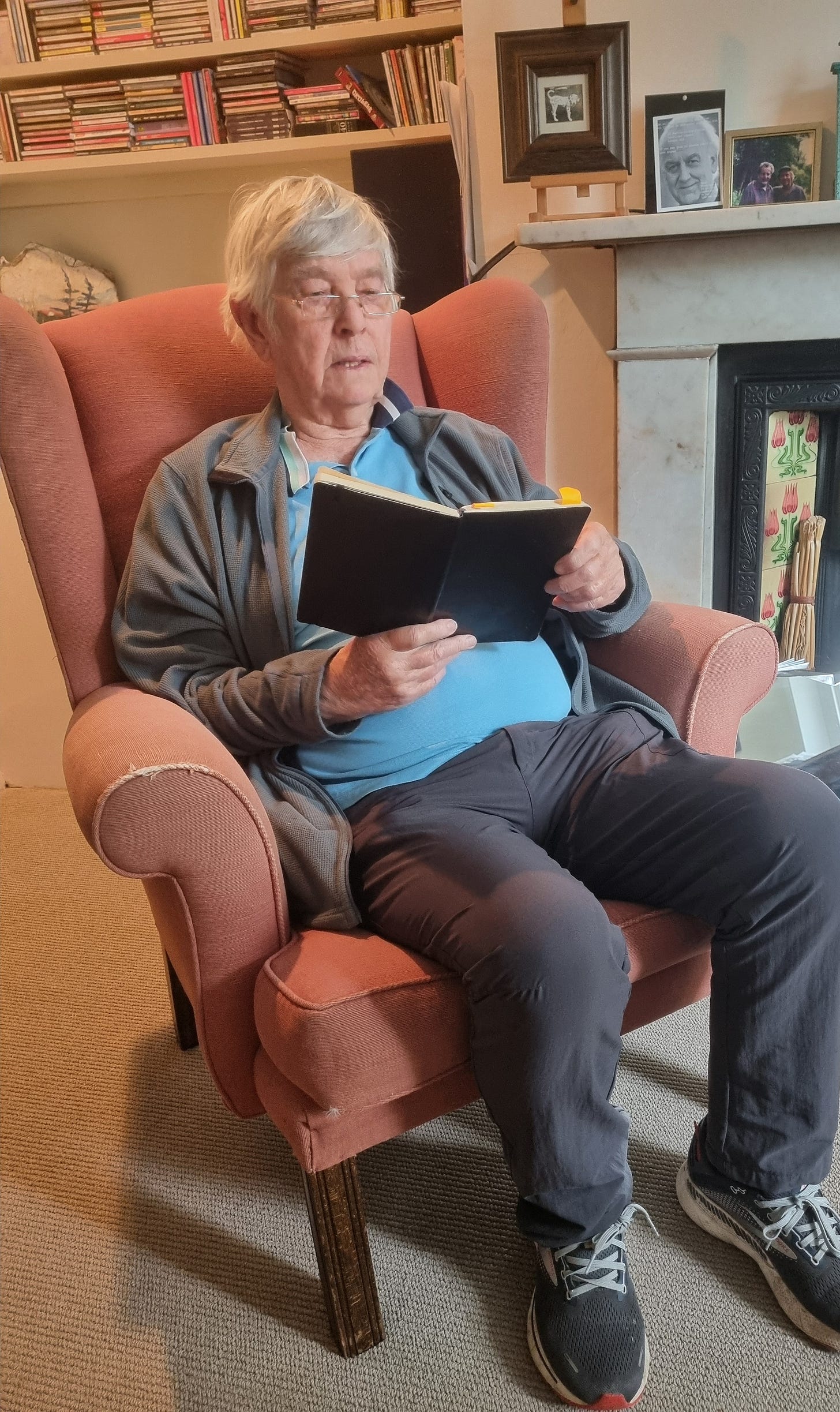Would you like to be President of the Philip Larkin Society? That was the question. You bet. Even though on my appointment, some scamp on X wrote (with impressive alliteration) that I am “the sort of liberal luvvie Larkin would have loathed”. However, it’s been nothing but a joy, albeit with some tough moments.
Earlier this month I was tasked with reading An Arundel Tomb in St Gabriel’s church following the unveiling of Barbara Pym’s Blue Plaque above her flat in London. Pym particularly liked this poem and chose it as one of her discs to take to a Desert Island, which certainly shows devotion to the cause. Imagine coping with An Arundel Tomb on a desert island. Anyway, I was asked to read it and so I did, in front of an eclectic crowd, (very much not cut-price), including the Rt Revd Lord Richard Harries, the former Bishop of Oxford, the journalist Hannah Betts and the historian Lucy Worsley.
When I got to the final, famous couplet, everything threatened to go, if not pear shaped, then decidedly tear-shaped. That my beloved husband was sitting listening to me in the front pew was part of it. But it delivers such a powerful blow.
Side by side, their faces blurred
The final line is on the gravestone of a dear friend of mine, who died twenty years ago aged 41, and I am sure it is carved on the memorial of many, many others. Of course the whole thing is written out on a plaque in Chichester Cathedral where the actual count and countess lie in stone. It was chosen as the quotation on Larkin’s own plaque, unveiled in December 2016 at Poet’s Corner, Westminster Abbey in front of another eclectic gang of Larkin devotees, including Baroness Virginia Bottomley, Blake Morrison and Grayson Perry.
Before this, the plans for the plaque caused a bit of a stir in the PLS. It was going to have just the last line as the inscription, but after a heated debate, the PLS insisted both it and the one before were used. Because, like all great poetry, the couplet is ambiguous. Some think the penultimate line causes one to discount, or certainly to doubt the final line. As Clive James wrote in the New York Times, “Larkin spoke and wrote the allusive, indirect and ironic tongue of the British literary world. In a time that grows more literal-minded almost as fast as it grows less literary, a tongue in the cheek will always need translating.”
Larkin’s plaque in Poet’s Corner, Westminster Abbey
Almost Instinct Almost True is also the title of an album by indie band Vulgarians, and the name of a short play by Rita Ippolit which was a sensation at the 2022 Edinburgh Fringe and has just had a run in the Old Red Lion, Islington. Last Saturday the production came to Hull and was performed by Julia Munrow and Teddy Walker to the Philip Larkin Society after its AGM in the Hull History Centre.
It was an interesting piece, depicting the relationship between Larkin’s erstwhile lover Monica Jones, who was an English university academic and one of her students, a fictional creation. Using an actual letter to Monica from Larkin, it examines the complex and unbalanced nature of the on-off relationship between the two. At the end, the Chair of the PLS Professor Graham Chesters, who knew Larkin personally, remarked that as we were all sitting within yards of the Larkin Archive, which includes these letters to Monica, the show was particularly meaningful.
All of which brings me to my most recent duty as President of the PLS which I performed this week, namely cycling over to see the great actor and Larkin specialist Sir Tom Courtenay, who was born in Hull but who now lives in London. Among other things, such as picking up a knighthood, three BAFTAs and a Golden Globe for acting, Sir Tom enjoys a side hustle reading (and occasionally performing) Larkin poetry, which he does brilliantly. Here he is, reading Here Larkin’s great poem about Hull, the “large town” which was his muse.
My appointment with Sir Tom was in order to record him reading the poem Church Going, for the Society’s wonderful podcast Tiny In All That Air , which comes out every two months. The next installment is going to be devoted to the collection The Less Decieved, in which Church Going was published.
Sir Tom Courtenay reading Larkin
He only needed one take. After he had finished, he then read First Sight, Larkin’s sonnet about new born lambs in the snow, and was overwhelmed. Reading aloud is such a powerful and deliberate act, almost like entering physically into the body of the text. Anyway, he was overcome by emotion. What is it about Larkin that makes one well up? Perhaps the everyday language, or the deliberate ambiguities. I didn’t quite know where to look, but after a while Tom gathered himself, smiled impishly and called his English setter, Nellie, for me to pat. It was a classic English moment and I think that Larkin would have relished it.
Meanwhile, I would be a very bad President if I didn’t draw your attention to the possibility of joining the Philip Larkin Society, which acts as a national and international focus for Larkin’s poetry. There is a regular magazine, wittily entitled About Larkin and hilarious merch, including some very grumpy Christmas cards and a tote bag which has one of his OTHER famous second lines as its, er, final blazon.









What a wonderful President! Rolls up her sleeves, cycles across London, always keen to come to Hull - and knows her Larkin! We like our luvvie lots.
Congratulations, very pleased the honour has gone to this 'liberal luvvie'! 'Reading aloud is such a powerful and deliberate act' - this rang such a bell - even alone, it takes on a different life to in your head